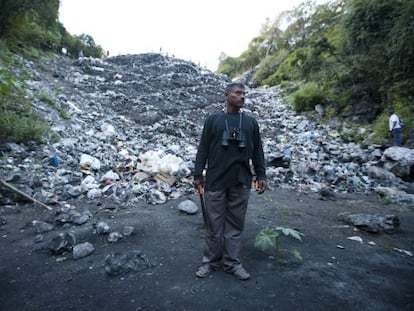Experts ask Mexico to continue search for 43 missing students in Iguala
International expert committee says students’ destination remains uncertain


In February, the Mexican Prosecutor General’s Office said 43 missing students from Guerrero (southern Mexico) were killed and their bodies were burned in a garbage dumping site. Yet, a group of experts from the Inter-American Commission on Human Rights (IACHR) who are reviewing the case now say they cannot be certain about what happened to the students and they call on Mexican authorities to continue the search. “All the hypotheses are on the table,” said Spanish psychologist Carlos Beristain, one of IACHR’s investigators.
The committee has been visiting Mexico since the beginning of March to evaluate whether Mexican authorities have done everything possible to locate the students. It has asked the Prosecutor General’s Office to use satellite technology from other countries to take more photographs and provide more evidence about what happened at that dumping site in Cocula where the hitmen said they had cremated the bodies of the missing who were delivered to them by Iguala municipal police on September 26. According to their account, they threw the remains a nearby river to destroy all evidence.
Reviewers are also concerned about judicial handling of the case. A judge determined that the event was a case of kidnapping and homicide but the committee has asked officials to treat it as a forced disappearance - a crime against humanity that is not subject to statutes of limitation. “This would raise the international profile of the case,” said Colombian attorney Ángela Buitrago.
As the investigation progressed, Mexican authorities have found an endless number of new victims. In the last few years, the hills around Iguala have become the unmarked grave of dozens of people whose disappearances were not investigated. The committee recommends the use of laser technology to locate disruptions in the topography of the hills that may serve as clues to locations to more secret graves.
Meanwhile, Grupo Interdisciplinar de Expertos Independientes (GIEI) - an association of international experts - says it has had full access to the case files. In a statement read to the press, its members acknowledged “the good disposition, reception, assistance, and protection” of Mexican authorities. This is not a gratuitous declaration given that the relatives of the missing and the organizations that assist them believe the government is doing everything possible to close the investigation and to set up obstacles to prevent the truth from being revealed.
And, this case has chipped away at the credibility of Mexico’s institutions. Several politicians, police officers and local drug dealers are implicated in the Iguala tragedy. A fatal combination of the evils of poor security in the country. Although the police have arrested 99 suspects and carried out hundreds of investigations and interrogations, lingering doubts about the case have smeared the reputation of one of President Enrique Peña Nieto’s strong men, Prosecutor General Jesús Murillo Karam.
Since the disappearances of the students in Iguala, a group of relatives sit in vigil in the schoolyard in Ayotzinapa, awaiting their loved ones. The school is a first-rate student teacher college serving the rural parts of Guerrero, one of the poorest and most violent regions of the country.
Experts have asked authorities to set up a medical center for the relatives who are exhausted after six fruitless months of waiting. And, they have called for a second neurological evaluation for Aldo Gutiérrez, a student the police shot in the head on the night of the incident.
Translation: Dyane Jean François
Tu suscripción se está usando en otro dispositivo
¿Quieres añadir otro usuario a tu suscripción?
Si continúas leyendo en este dispositivo, no se podrá leer en el otro.
FlechaTu suscripción se está usando en otro dispositivo y solo puedes acceder a EL PAÍS desde un dispositivo a la vez.
Si quieres compartir tu cuenta, cambia tu suscripción a la modalidad Premium, así podrás añadir otro usuario. Cada uno accederá con su propia cuenta de email, lo que os permitirá personalizar vuestra experiencia en EL PAÍS.
En el caso de no saber quién está usando tu cuenta, te recomendamos cambiar tu contraseña aquí.
Si decides continuar compartiendo tu cuenta, este mensaje se mostrará en tu dispositivo y en el de la otra persona que está usando tu cuenta de forma indefinida, afectando a tu experiencia de lectura. Puedes consultar aquí los términos y condiciones de la suscripción digital.









































